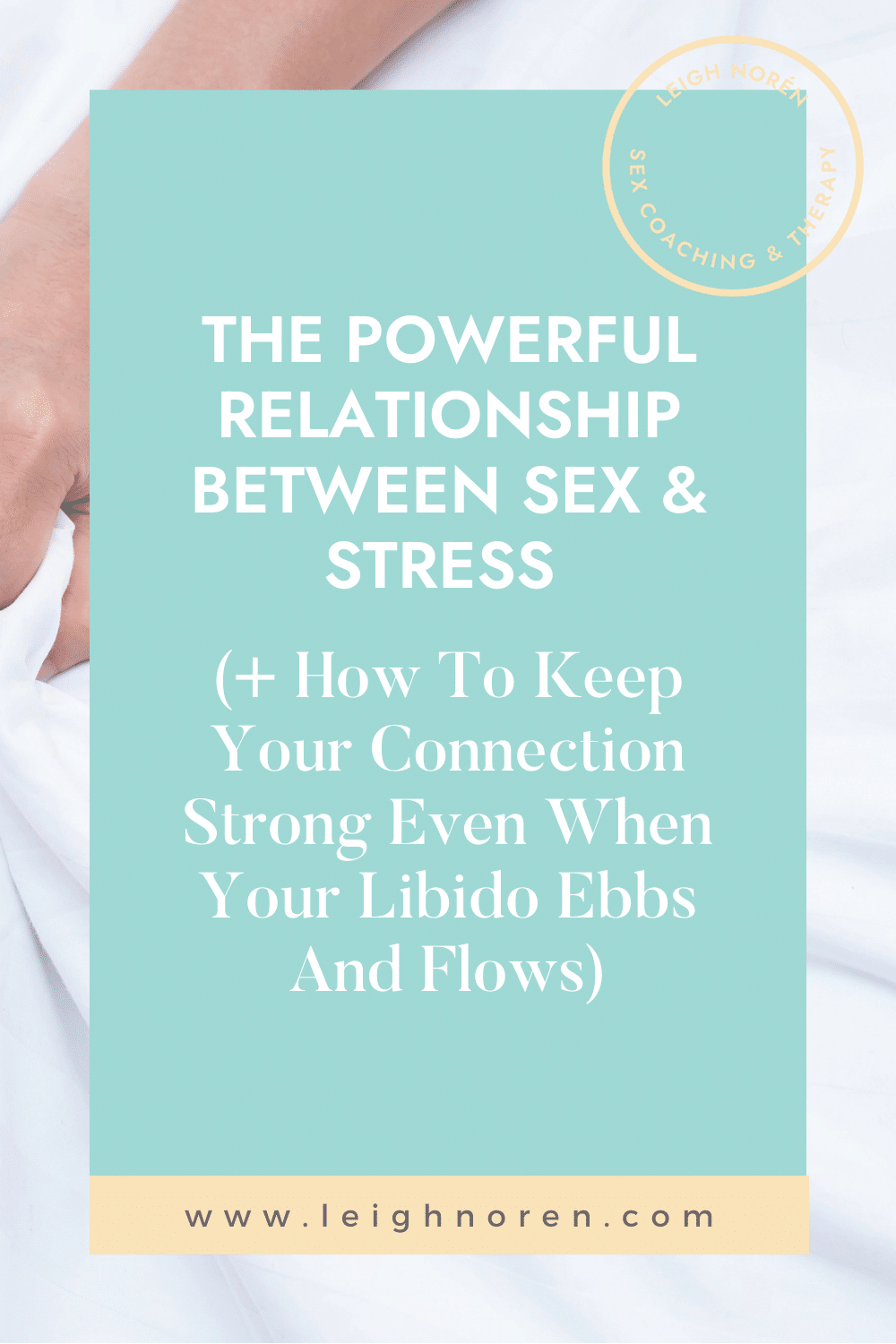The Powerful Relationship Between Sex & Stress (Plus How To Keep Your Connection Strong Even When Your Libido Ebbs And Flows)
6 min read
Sex and stress – friends or foes? At a first glance, the answer might seem simple – stress kills desire. But as a formally trained sex therapist and coach, I can tell you it’s a little more complicated than that. And even if stress does a number on your libido – there are lots of ways of keeping your connection strong in the meantime.
Sex and stress – increased desire
Sex and stress – two key elements I often discuss with my clients. Usually it’s about how stress negatively impacts sex drive. But for others, it’s about how stress actually propels them towards sex.
The reasons for sex increasing sex drive are several.
We all have a way of relating to people in our lives, what we often call an attachment style. For some of us, our attachment style has evolved to create desire for connection in times of stress. This means the more anxious or stressed out we are, the more desire and arousal we can experience.
This is because desire creates situations in which we can be validated by our partner. The more sex we have, the more loved and appreciated we feel. To learn more about the specific attachment style that can create increase desire, read my blog post: Can emotions affect sex drive? Yes, and here’s how.
Other times, stress gets our libido going because it’s our favourite decompressing activity. According to experts, the act of sex releases feel-good hormones and combats stress hormones, leading us to feel more relaxed and happy. Instead of having to wind down in order to have sex – we have sex to wind down.
However, while stress can spike sex drive, it more commonly does not.
Sex and stress equals low desire, too
Stress is both a psychological and physiological experience. Stress floods us with both stressful thoughts as well as stress hormones.
These hormones signal to our brains that we’re in danger. And when we’re in danger – sex is seldom a good idea. Instead our body and mind become focused on leading us to safety; whether it’s about a deadline at work or actual threats to our lives.
Stress about work
When we’re caught up in thoughts about upcoming presentations to prepare or frustrating customers – sex is the furthest thing from our minds. And this is partly why sex and stress don’t mix well, because we’re not thinking about sex when we’re stressed.
That which we focus on tends to grow. The stuff we don’t, tends to vanish (like, our sex drive).
If all you think about is work (and trust me, as an entrepreneur, I get it!), expecting yourself to also want sex is like expecting a miracle. And I don’t say this to be harsh.
I say this because our view of sex drive is often skewed. And with this skewed view come unrealistic expectations of ourselves, our partners and our sex lives.
We expect ourselves to want sex spontaneously, out of the blue, no matter what we’ve got going on in our life or how stressed we are.
If not tended to, these expectations can make us believe something is fundamentally wrong with us, when there isn’t. And when we believe we’re broken – it makes it increasingly more difficult to feel a longing for sex. Understanding that sex and stress are natural opponents can help you see there’s nothing wrong with you.
Taking care of your kids
Now you know how important your brain is to sexual desire – it’s probably easy to see how the day-to-day of rearing children cannegatively impact your longing for a quick romp in the sack.
Because if your brain needs to focus on sex to want sex; drying snotty noses or helping your kids with their homework isn’t exactly great foreplay.
Add to that, the stress of upset babies or angry teenagers, and it quickly becomes apparent how our state of mind can lead to low desire.
WANT YOUR SEX DRIVE BACK?

My free resource The Desire Test helps you take that first step towards an increased sex drive, by understanding your decreased desire.
Take the 10-page assessment quiz, get the answers you need to understand what’s standing in the way of your desire, and get free sex and relationship tips directly to your inbox. You can unsubscribe at any time.
Stress about our relationship or marriage
Along with the daily stressors or work and children, the state of our relationship or marriage is also a key factor in whether we feel like sex or not. And this is where managing expectations in relationships is so key.
If we want to stay close with our partner and increase intimacy we need to get realistic about what this entails. Expecting ourselves to be just as turned on by our partner 11 years into our marriage, as the day we met, isn’t realistic.
This doesn’t mean long-term relationships can’t be sexually and romantically fulfilling (because they can!). I wouldn’t be in this line of work if I didn’t know this to be true.
What it does mean is getting clear on whether or not your expectations of your partner and yourself are fair.
If you’ve been annoyed with your partner lately.
Or you’ve been fighting about finances.
Maybe you’ve been struggling to find just 10 minutes where you can sit down together and look each other in the eyes.
Expecting these stressors to not affect your sex life isn’t fair on any of you.
Sexual Stress
Alongside all of the day to day stressors – there is also the sexual stress that can negatively impact your desire. Stuff like:
- Feeling like you have to have sex once a week
- Feeling like you have to perform during sex by having explosive orgasms
- Feeling like you have to get turned on as quickly as your partner does
are all examples of stressful thoughts that can make it increasingly difficult to ever feel like you want to have sex with your partner.
If this sounds like you, know it makes complete sense you don’t want sex right now. Understanding the relationship between sex and stress is paramount – both for you and your partner.
How to keep your connection strong when you have low libido
So, if stress is a regular part of our lives, what’s the solution, you ask? Well – there are lots of them and it depends on what the stressor is and how you’d like to deal with it. In essence though, you need to learn how to deal with stress and find ways of connecting with your partner.
When you develop stress management techniques and pair it with low-stress ways of connecting with your partner – you can keep your connection strong.
Sometimes connection can be boiled down to establishing a morning routine for sex and emotional connection. Put simply, this means creating a ritual that will infuse your relationship or marriage with intimacy, even when you’re short on time or stressed.
Other times, how to keep a relationship alive and your connection strong, is about taking an intimacy inventory. Really looking at your relationship from every angle and assessing what your intimacy strengths are and where there is room for improvement.
Sex and stress
Whether stress kickstarts your desire or blocks it – it’s clear stress is a powerful force that we cannot control – yet need to learn how to deal with.
When we pair this with ways to boost connection in times of little to no sex, our sexless marriage or relationship doesn’t become a threat to it’s very existence.
If you’d like more help and specific techniques on how to reduce the pressure and stress surrounding sex (and in general in life, too!), check out my online program Re:Desire. Re:Desire is a hybrid of an online course and 1:1 support features, helping you to increase desire and intimacy *without* sexual stress.

Zero sex drive?
You’re not alone! Download the 10-page Desire Test to find out why your desire for sex is gone (and what to do about it).
Questions based on a variety of factors proven to negatively affect desire
Find out which factors are responsible for your low or non-existent sex drive
Get instant access to expert advice, delivered directly to your inbox when you download The Desire Test. Unsubscribe anytime.
WANT TO KNOW MORE ABOUT THE DESIRE TEST?
With 9 years of experience as a sex therapist and coach - Leigh helps her clients create stress-free, shame-free, pressure-free sex lives, through her unique combination of sexological science, & psychotherapeutic & coaching tools.
OTHER POSTS YOU MIGHT ENJOY
Copyright © 2019-2026 Leigh Norén. All Rights Reserved. | Website by Pinegate Road
Cookie policy | Terms & Conditions | Privacy Policy


